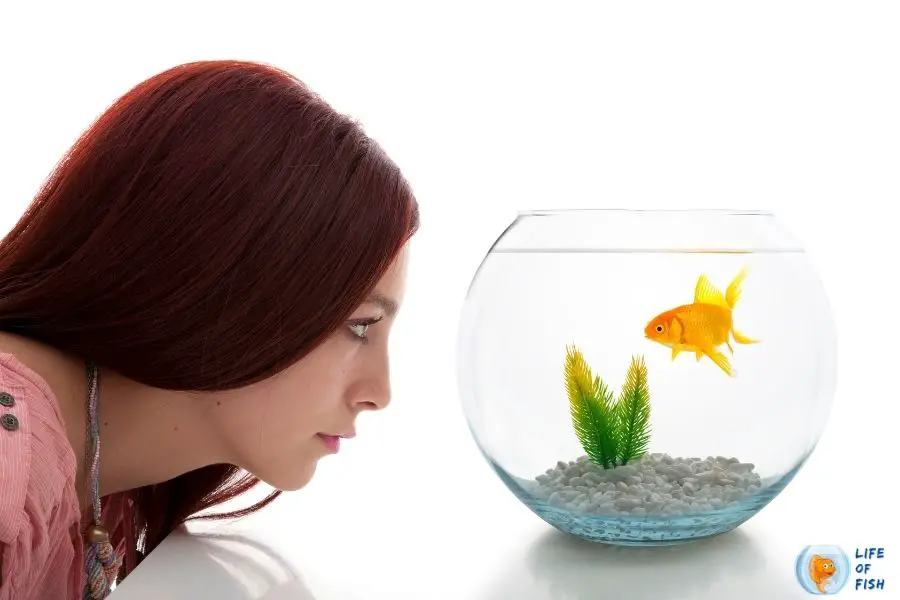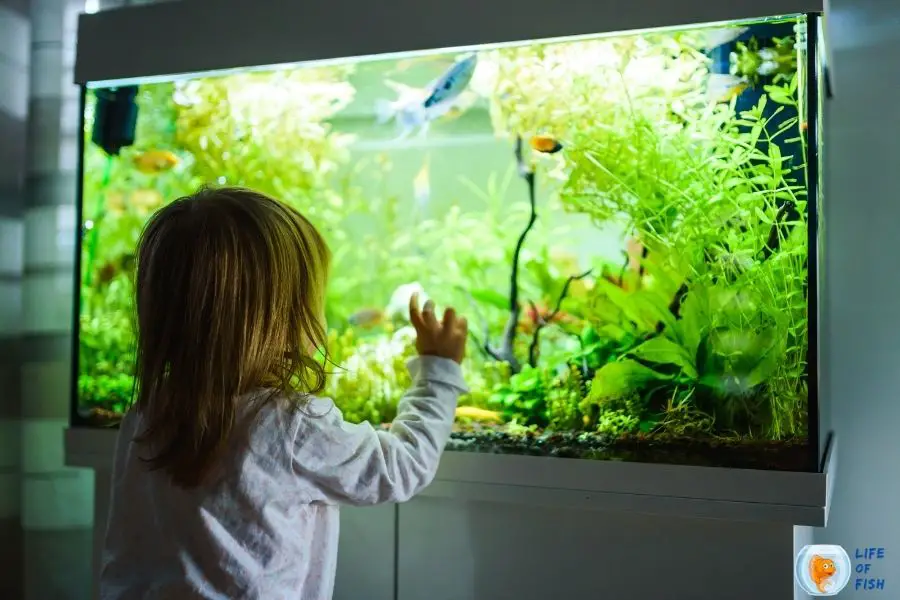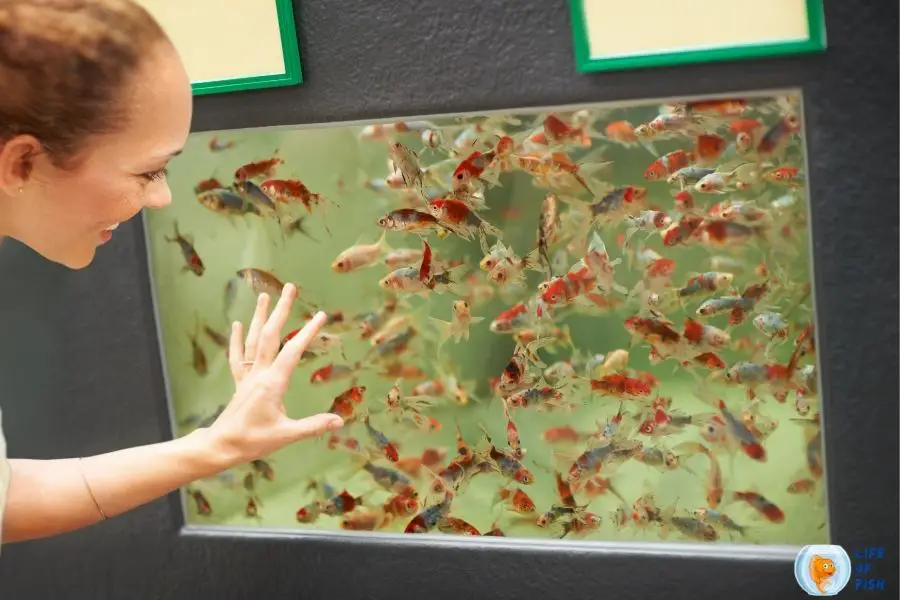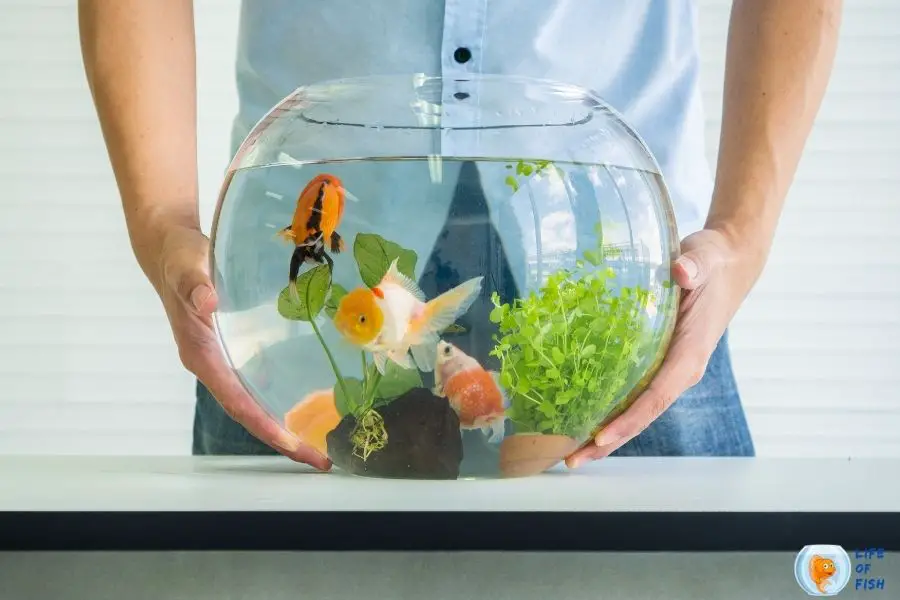Can fish love their owners? This is often a debating question among fish keepers.
However, I can say, Some fish species are more intelligent than most other fish. Those who are more intelligent show signs of emotions and social behavior. They recognize their owners and even greet them.

When we raise a pet, we expect it to love us. This is actually true for four-legged pets like dogs and cats. Satisfyingly, they do love us.
But, in the case of pet fish, we do not expect the same thing from them. It’s long known that fish do not have feelings and thus do not show any affection to their owners, even to other fish.
But, recent researches tell us otherwise.
If you are still in doubt about this topic, read on to know more about scientific proofs that show that fish can love their owners.
Can fish love their owners?
Jump To
- 1 Can fish love their owners?
- 2 Studies about fish memory and their feelings
- 3 How do you tell if your fish loves you?
- 4 Do fish remember you?
- 5 Can fish form relationships?
- 6 What does it mean when a fish follows your finger?
- 7 How do you know your fish is sad?
- 8 Can fishes hear the sound?
- 9 Can you train a fish?
- 10 Related questions
- 11 Do fish get bored?
- 12 Do fish like to be touched?
- 13 Can my fish see me through the tank?
- 14 Conclusion
It is a well-known fact that fish only have a three-second memory.
We assumed that fish do not remember anything and have a concise attention span according to this fact. However, recent studies done by scientists have proved that this information is not accurate.
Some fish species have a memory that lasts for up to five months. They can recognize their previous owners and distinguish between strangers and friends.
Apart from having a good memory, fish are also known to have a very good sense of hearing. They can hear low and high-pitched sounds. They can even identify the voices of their owners and respond to them.
So, if your fish greets you every time you come in front of the glass aquarium, it signifies that your fish recognizes you and is happy to see you.
Studies about fish memory and their feelings
Like you and me, some scientists believe that fish also have a memory span and feelings. Therefore, some studies have been conducted to determine if this is true.
Research about fish memory
Scientists from the University of Oxford ( U.K.) and the University of Queensland in Australia have conducted a study to test fish’s memory span. For this study, they have selected archerfish.
Why specifically this fish? It’s because these fish can spit jets of water to prey on insects flying above the water’s surface. They are known to have high accuracy in hitting the target.
In this study, scientists presented two faces of humans above the water surface and trained the fish to choose one face by spitting water at that face.
They bribed the fish when the fish spit water at the right face, and the fish picked up this trick very quickly.
After five to 14 days, the fish could learn to recognize the faces presented and spit water at them. They could acknowledge even black and white images of those faces and evened out head shapes too.
According to this study, the scientists assumed that fish could possibly recognize their owners’ faces and even remember them for a long time.
A study about the emotions of cichlid fish
Cichlid fish are popular among fish keepers because of their beautiful colors and patterns. But, what makes them even more amazing is their social behavior.
In a study conducted by the University of Burgundy in France, it was found that cichlid fish have emotional attachments and feelings. This study has selected convict cichlids because they are known to keep long-lasting pairs.
Scientists discovered that when female cichlids lose their selected partners, they become depressed and pessimistic about the world.
For this study, they initially introduced two males for one cichlid female. Of the two, the female chose one partner by showing her affection, but the scientists didn’t allow her to be with the selected partner for long.
At some point, scientists tried to pair up the female with the rejected male, but they were slow to spawn.
Then scientists conducted another study to check fish’s optimistic or pessimistic behavior. They provided two boxes; a white one with some treats and a black one without treats.
With some effort, females cichlids learned to get the treat from the white box and realized that the black box didn’t have any.
Taking one step ahead, scientists provided a grey box to the fish. They assumed that if the fish were optimistic, they would try out the grey box, and if the fish were pessimistic, they wouldn’t. As they expected, the female fish ignored the grey box.
This study shows that when a female cichlid fish is rejected by its chosen partner, it becomes pessimistic. It means that fish also have feelings and emotions.
These studies show that fish also have memory, feelings, and emotions. So, if you are a fish owner, it is very likely that your fish recognizes you and might even have some emotional attachment to you.

How do you tell if your fish loves you?
While some may not accept it, many fish owners know some signs and behavior of their fish by experience when they love their owner.
It may take some time for you to understand, and there are no specific scientific methods to tell if your fish loves you but here are some possible signs:
Your fish follows you around
This is one of the most common signs that show that your fish loves you. If your fish consistently follows you around whenever you are near the aquarium or pond, it is a sign that it loves you.
Your fish comes to the front of the tank when you approach
Another common sign is when your fish comes to the front of the tank as soon as it sees you approaching. This signifies excitement and happiness and shows that your fish loves your company.
Your fish eats from your hand
This is a huge sign that your fish loves you. If your fish is comfortable enough to eat from your hand, it means that it trusts you and feels safe in your presence.
Your fish will swim happily around the tank when you are around
This is another common sign that your fish loves your company. A happy and content fish will swim happily around the tank whenever you are near.
But, when someone else is near, your fish may hide or stay at the bottom of the tank.
These are some possible signs that show that your fish loves you. Remember, every fish is different and may show different signs. The best way to know if your fish loves you is by observing its behavior.
Do fish remember you?
Yes. If you are the person who feeds the fish and takes care of them, then it will remember you.
As we mentioned before, there is scientific evidence that fish have memory and can recognize faces.
In a study, scientists showed that archerfish could remember their owners’ faces when they were trained.
So, assuming that most other aquarium fish are unintentionally trained to see the same face every day, it is likely that they will remember you.
However, it is not clear how long they will remember you. If you go away on vacation for a month, your fish may or may not recognize you when you come back.
Some scientists say that the memory of a fish is very short, and they only remember things for a few seconds. Others say that the memory of a fish can last up to 3 months. So, it is still not clear how long the memory of a fish lasts.
But, one thing is inevitable if you are the person who takes care of the fish, it will remember you and may even have some emotional attachment to you.
Can fish form relationships?
According to the social behavior study mentioned above, fish can form relationships. This might be true only for some fish species as not all fish behave similarly.
But, it is inevitable that if you treat your fish well and spend some time with them, they will remember you and might even form a bond with you. Some fish that are known to form a bond with their owners are,
- Cichlids
- Tiger Oscars
- Goldfish
- Pacu
Some other fish do not care about their owners are,
- Guppies
- Mollies
- Plecos

What does it mean when a fish follows your finger?
Many fish species follow their owners’ fingers, thinking it’s time to feed. They might even follow you around when you are nearby.
However, some aggressive fish species might attack your finger, thinking it’s food. So, you should be careful when you put your finger in the tank.
How do you know your fish is sad?
When your fish is sad, it will show signs and symptoms of stress. The most common signs are,
- hiding
- loss of appetite
- swimming erratically
- staying at the bottom of the tank
- gulping air at the surface
- rubbing itself on gravel and rocks
- attack other fish
These are some common signs that your fish is sad or stressed. If you see any of these signs, you should try to figure out the reason and take the necessary steps to make your fish happy again.
There are many reasons why your fish might be sad or stressed. It could be because of the environment, changes in the tank, or even your own behavior.
The best way to make your fish happy again is to find out the reason for its stress and take steps to fix it.
For example, if the environment causes stress, you can try to make some changes to the tank. If the stress is caused by your own behavior, such as making loud noises, not cleaning the tank often, or not feeding the fish on time, you can try to change your behavior.
Can fishes hear the sound?
Yes, fish can hear sound. They have a special organ called the otolith that helps them detect vibrations in the water. This allows them to hear sound in their own unique way.
Some fish use sounds to communicate with each other. For example, male fish might make a grunting sound to attract mates. Some fish might make a clicking sound to warn other fish of predators.
Fish can also hear sounds outside the water. For example, if you make a loud noise near the tank, the fish will be able to hear it and might get scared.
Can you train a fish?
Now that we know that fish have feelings and can recognize others. We know that they also have a good memory than we expected. So, it is possible to train a fish.
There are many ways to train a fish. For example, you can train your fish to come to the surface when you call its name. You can also train your fish to do tricks, such as swimming through a hoop or following your finger.
Training a fish takes time and patience. But, it is possible to train a fish if you are willing to put in the effort.
However, you may succeed with only some fish species as not all fish can be trained in the same way.
The best fish species for training are,
- Goldfish
- Cichlids
- Oscars
- Bettas

Related questions
Do goldfish recognize their owners?
Yes. Goldfish may get scared initially.
But when the time passes, they understand that you are not a threat to them and start recognizing you. In fact, goldfish are one of the few fish species that interact with their owners.
Do fish get bored?
Yes, fish can get bored.
This is why it is essential to provide them with a stimulating environment. For example, you can add some new plants or toys to the tank. You can also try different types of food to feed them.
Do fish like to be touched?
It depends on the fish species.
Some fish species like to be touched, while others don’t. For example, goldfish and koi are two fish species that enjoy being touched. On the other hand, bettas and plecos don’t like to be touched.
It is best to research the fish species before you try to touch them.
Can my fish see me through the tank?
According to the studies mentioned before (specifically the study involving archerfish), fish have better eyesight than we thought. So, it is likely that your fish can see you through the tank.
Conclusion
Studies have shown that fish can recognize their partners and even humans. Further, fish have feelings (if not like us) on their own.
Can fish love their owners? According to the research, it is obvious that fish can love their owners. However, that depends on the fish species and how you treat them.
Some might not believe it, but plenty of fish owners have a strong bond with their fish. So, if you treat your fish well, there is a chance that they will love you back!
Read Next : Kamfa Flowerhorn Care | Fish With A Big Head |
